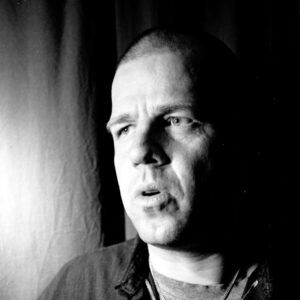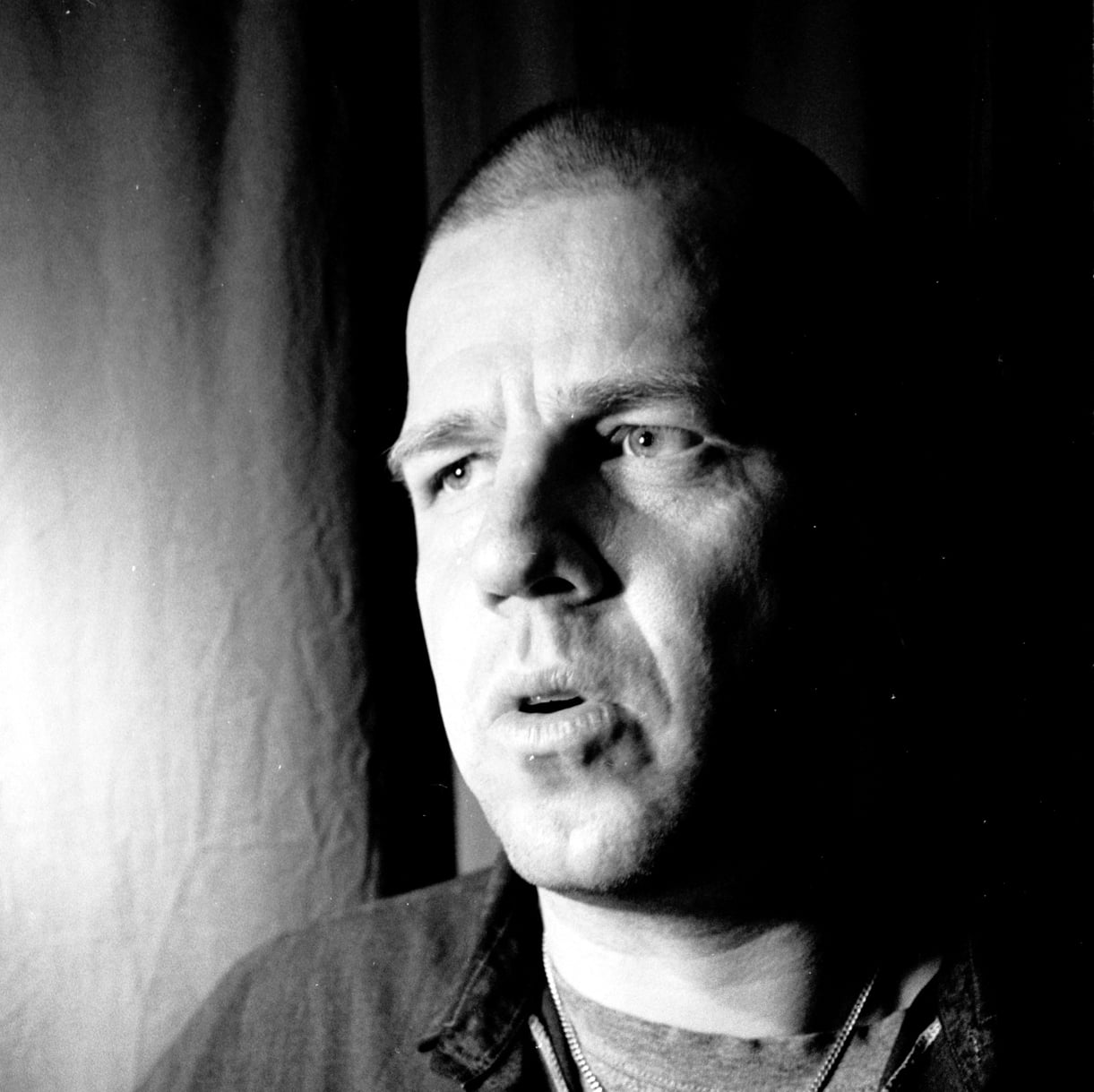Another gentle giant, fallen (Thomas Tibert, 1961-2022)
I first met Thomas Tibert at a party in Stockholm in 1988. I had gotten to know Peter Bergstrandh, bass player extraordinaire with one of my fave bands, Lustans Lakejer, and had courted him to be part of White Stains – my band that had already existed in a few different line-ups since 1987. Peter turned out to also play with Thomas, and Thomas had his own studio called Hit & Run. He made jingles and studio work, as well as recording independent bands, in his own apartment. Opportunities abounded!
When we had crossed the first introductory hurdle (“Do you like TG?” Affirmative!), it was all excitement and energy. We started recording with me, Thomas, Peter and Jan Ekman (the other original founder of White Stains), and we were immediately productive. Thomas travelled with me and Jan to the Hultsfred Festival for the first ever concert in the summer of 89. Thomas mixed us exquisitely while we were making a lot of noise, and the result is actually quite good (available on the “The Somewhat Lost Horizon” album). Three singles were released during 1989, and towards the end of the year we recorded our first album (with me, Thomas, Pär Aronson, and Genesis & Paula P-Orridge). This became the classic “At Stockholm,” released in 1990.
We stormed on with album no 2, “Dreams Shall Flesh,” which was a weird mix of poppy stuff and experimental shenanigans (including one track by Anton LaVey and one by The Hafler Trio). Peter was a true musical motor and Thomas a very talented programmer and producer. Per Svensson was a new and great guitar addition, riffing away in wonderful ways. I did my impresario thing and wrote the lyrics and then I also… ahem… “sang” them.
Working with Thomas was a joy. He was sensitive, understanding, creative and simply a great sound man. He came up with weird production angles and suggestions that I certainly couldn’t have. It was in his mind, not his intellect, and when he had fiddled for a bit we were most often awestruck at his gift of making sounds considerably more than sounds.
This became even more obvious when we started making soundtracks together. Some were for my own experimental films, and others were just made for the hell of it – as in “imaginary” films. We spaced out and in, and came up with some pretty solid scores that work very well still; with or without accompanying films. Most of these were collected and released on the Anckarström album “The Somewhat Lost Horizon” (1992).
For some reason or other we drifted apart after this. I worked with Peter on different kinds of soundtracks that ended up on the albums “Misantropotantra” (1992) and “Why Not Forever?” (1994) I also drifted into solo work in Peter’s and mine “Immergeil Studios.” Life just happened, I guess.
Around the big “Y2K” (that’s the “millennial shift” for you youngsters out there) we resumed contact again. Thomas had moved with his family to Tärnsjö, a couple of hours northwest of Stockholm, and keeping busy with many exciting music technology and sampling products. Several of his series of sampling CDs and bundles became global bestsellers, and although this was surely great, he seemed to be missing some real dark music-making. We came up with the new project Cotton Ferox, and we agreed to alternate so sometimes he’d be Cotton and I Ferox, and vice versa. As written out in the “Cotton Ferox Manifesto,” it was all about transcending apparent dualisms, and we tried to keep that as a creative concept in the music making as much as we could.
We recorded, started performing live (Stockholm, Copenhagen, London) and collaborating with others (Genesis P-Orridge again, Krister Linder, Michael Moynihan). Gen came over to Stockholm again for a new project, and we used some bits of those recordings for the first Cotton Ferox album: “First Time Hurts” (2002). The second one was our second Gen spoken word album, called “Wordship” (2004).
There was always something going on: compilations, new collaborations, concerts (a Russian mini tour, Poland several times, London) and the compilation albums “Defragmental” (Cotton Ferox, 2007) and “Exploratorium” (White Stains, 2007). Whenever we felt motivated we got together or just sent files in-between us. A slow process of getting together the “third” album, something which never really happened. Instead, we created the side project The Mushroom Clouds, together with lovely singer Elisabeth Punzi, and released an EP in 2010.
In 2013 we reformed White Stains for a night in Gothenburg together with Genesis P-Orridge and great guitarist Eriq Olin, and it was a great reunion of sounds, spirits, and souls.
In 2013, we also set the magical Mega Golem being free in a performance in Warsaw. We showed the Mega Golem film, and performed live together with Bartosz Szamitowski. I cannot describe this evening in any other way than that its was absolutely peak Cotton Ferox. We were never better; neither before nor after.
At about this time, our views and aesthetic preferences had started drifting apart, and it became more and more noticeable as we kept performing. This is just a natural process of development. I wanted to be in and on my own trip to a greater extent, and Thomas had moved to Poland and started making great music with Bartosz as “Audio Spirits.” Much of their amazing music will be released during 2022, I hope.
At the end of December 2021, we had resumed a positive contact, discussing a possible box set release of all the great music we’ve made over the decades. I’m sure this will still happen, but it’s sad that Mr T won’t be around in the physical realm to share the joy of us appreciating his sonic genius and audio wizardry.
In each creative relationship there are ups and downs, highs and lows. But whatever happened, we always drifted back to a Tibert-Abrahamsson “third mind” that was all about making a platform for what we both had inside. I wrote texts and weird lyrics on my own, but I was always sort of hearing Thomas’ dark soundscapes in my head while writing. They formed my textual output, adding to the psychedelic stew as much as I hope the vice versa case was true.
We traveled near and far together, and in many different ways. Music became a ticket to experience more. One tour comes to mind. I had been invited to exhibit photographs in Moscow in 2007. Around this a Cotton Ferox mini tour bloomed, which also led to us recording with some great St Petersburg artists, which led to the album “Mother Russia.” We offered something uniquely ours, and received a whole lot more.
A substantial part of my life is now missing. Friendship, a unique sense of humour, a shared sense of illumination in or out of the wild forests, a wordless symbiosis of sounds and scapes, a tacit sense of wonder in regard to what’s actually possible. It’s all a matter of focus and collaboration based on a kind of intuitive, purposeful play. If that is temporarily not there, then you simply move onwards until it comes back. But now I’m sad to say it won’t; this collaboration is no more… A huge loss.
Thomas is surely making music in Valhalla already, and will find many others to work with. I wouldn’t be surprised if there will be a spoken word project with Oden himself, and I look forward in awe to some day listening to it.
Carl Abrahamsson a.k.a. Ferox, Vimmerby Jan 23, 2022
Cotton Ferox – My Psychedelic Prayer (2003, for Thomas Tibert)
How does one carry on in the spirit of psychedelic illumination without being called an old hippie? I have no idea. How does one bring about radical, personal change for others to take further? I haven’t got a clue. How does one come to terms with the fact that the most grand and overwhelming changes all stem from subtle and quite often invisible sources and forces? I have no say in the matter. When you try to describe the essentially indescribable, there’s always the looming danger of becoming a missionary. And the missionary position is not necessarily the best one. It’s never a question of specific vested interests or even of control of the masses. Let’s not get paranoid. Let’s not get frightened. Let’s NOT get lost. It is however a question of a more profound quality. The one that constitutes the essence of what most people call their bad conscience. That quality is called honesty. You know what it means: Your own relationship to truth. If everyone were honest, the world would be a very different place, wouldn’t you agree? If we go beyond the enjoyable trip trappings, the sensuous neon lights of the soul, the creation of eternities in fragments of seconds, the upheaval of space dissolved in one human sublingual metabolism, one thing remains. It always remains: The challenge to embrace honesty.


